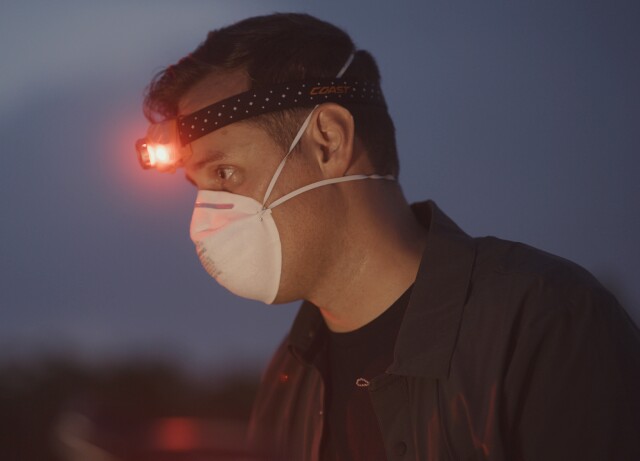"Virus Hunters," on Nat Geo, Reveals the Worst Could Be Yet to Come

The latest documentary on National Geographic raises such burning existential questions as: Does knowledge lead to more fears? and Do we need to be more worried about life on Earth than we already are? Sadly, the answer to both, at least after watching Virus Hunters, is a resounding "yes!" Or to put it in more specific terms, coronavirus is nowhere near as bad as what may be coming.
That statement should stop you cold. If not, check your pulse. While it may not seem possible that we are in for something worse than what we are going through this year -- considering that as of this writing, more than 44.5 million cases resulting in more than 1.17 million deaths worldwide are attributed to COVID-19 -- other possible pandemics lurk. What comes through plangently in Nat Geo's essential doc – premiering Sunday, Nov. 1 -- is that as you read this (and watch that) scientists are searching for the next potentially deadlier pandemic in hopes of warding it off before another virus hops to humans, as so many invariably do.
"It is important to pinpoint where the hot spot would be," Christopher Golden, an ecologist and epidemiologist featured in the film, told MediaVillage. "It could be anywhere. It could be in your backyard or somewhere more remote."
A National Geographic fellow, and a professor at Harvard University’s School of Public Health, Golden (pictured at top), like most scientists, isn’t prone to hysteria or hyperbole. Still, what he calmly lays out is nothing short of terrifying: More pandemics loom.
"All of the dynamics that drove coronavirus are the exact dynamics that drove SARS, MERS, Ebola, Swine Flu and HIV as well," he said. "[Ultimately] they are all showcasing how we are coming into greater and greater interaction with wildlife and domesticated animals."
If you have ever wondered just how a disease jumps species, this special – which also features ABC foreign correspondent James Longman -- explains it. Nearly three-quarters of diseases originate from animals. If an infected bat defecates on grapes or nibbles an olive, those foods could become tainted. However, the greater likelihood of transmission is through hunting, butchering and the preparing of contaminated meats.
Golden and Longman travel to Liberia, a west African country that had been hit hard by Ebola. From the moment they arrive at the airport, it’s clear how seriously the country enforces COVID testing to keep its population safe. There, they travel into the rain forest, where researchers study bats for diseases in hopes of discovering them before another global pandemic is sparked.
They stop at a bat cave where Ebola originated. There’s troubling evidence of skeletons of young bats lining the cave floor, but it’s not yet known why. As with any Nat Geo film, viewers are bound to learn. Golden reminds us that "bats have a unique evolutionary history; they are the only mammals to develop flight."
What’s remarkable about bats is that they have also evolved to carry certain diseases. This might sound like the sort of knowledge you glean from a Snapple cap and forget before you can share it with your trivia-loving friend. But, as Golden spells out in the documentary, “With that has come an immune system that allows certain types of diseases to proliferate without killing them. These diseases can then be transmitted to humans when there is some sort of human/bat interaction.”
Scientists need to stay a few steps ahead of bats or any diseased animals that have the potential to wipe out humans. But it remains extremely difficult to do so, especially when it comes to the food supply chain, even in developed countries where governments have safety controls in place.
And then there are markets, about which we all know much more since coronavirus entered our lives. But we don't know everything. As seen in the film, some of them shockingly sell dead animals gathered from roads.
Golden and Longman visit one where people sell bushmeat. "These people need to feed their families," Longman noted. "There is huge demand for it, and this is just one market." The documentary clears up a misconception many have about bushmeat; it’s not only the meat from bats, rats, monkeys and snakes in Africa. It is also game served on dinner tables in America. They visit a man who hunts deer for his family’s meat, some 300 pounds a year in Wisconsin.
A virus that hasn’t received much attention in the United States, Chronic Wasting Disease, is always fatal in deer, elk and moose. It hasn’t made its way to humans, but officials are wary because this virus destroys brain matter. The warning is clear: A pandemic can just easily start in the U.S. once it takes root in the food chain.
Not surprisingly, Golden defined the current era, the Anthropocene, "as a period of degradation of natural systems. It is a direct result of human activity, and so if you think about the unfolding of global events, deforestation, mining, freshwater scarcity, temperature increases -- all are driven by human activity and are reshaping the surface of the Earth," he explained. "And as we are doing that, the human population is increasing and coming into contact with domestic and wild animals, and this creates a landscape for human and animal interaction."
While Golden is in no way an alarmist, he added, "We should definitely be scared if we do not take this pandemic seriously both in terms of immediate action to course correct with the current disease and in developing true preparedness plans for what could be the next one."
Despite surging COVID numbers and recognizing that more deadly viruses are out there somewhere, Golden somehow remains optimistic.
"I think that there is still hope that every individual can change the trajectory of where the planet moves," he said. "Be more conscious of what you are buying and what you are eating. And next week, the election is critical. Vote from the standpoint as to how we choose to protect our environment and manage these diseases in an efficient way."
For more information and background, read Ed Martin's report on Virus Hunters.
Click the social buttons above or below to share this content with your friends and colleagues.
The opinions and points of view expressed in this content are exclusively the views of the author and/or subject(s) and do not necessarily represent the views of MediaVillage.com/MyersBizNet, Inc. management or associated writers.


